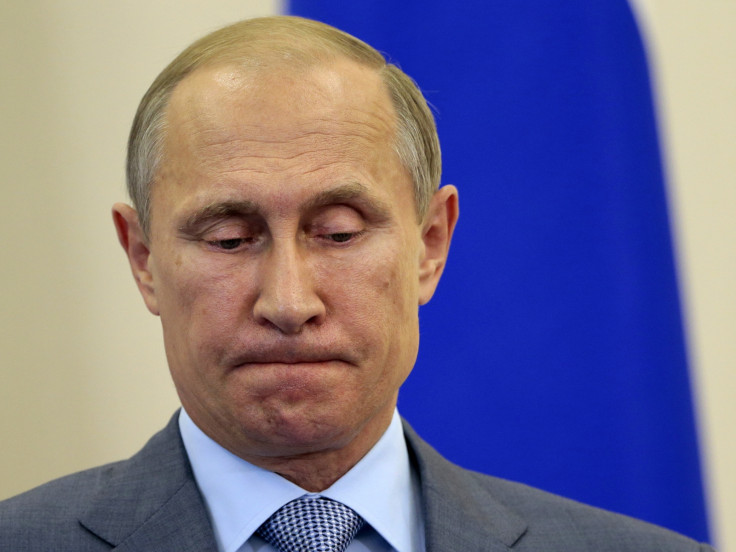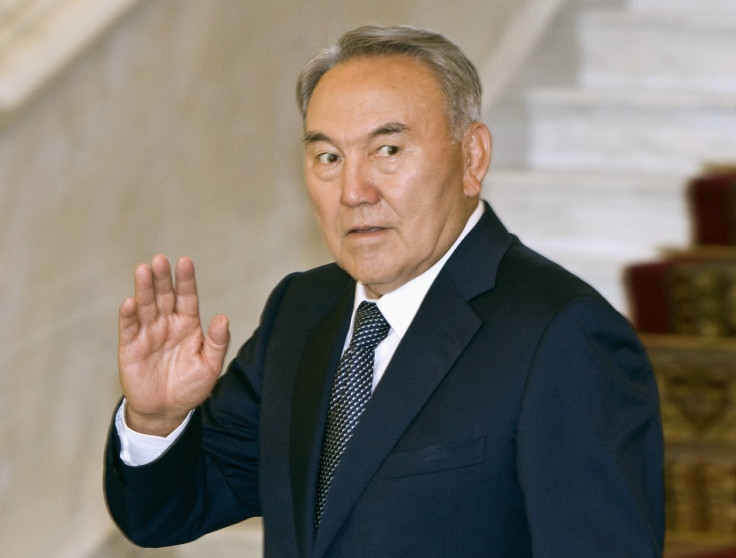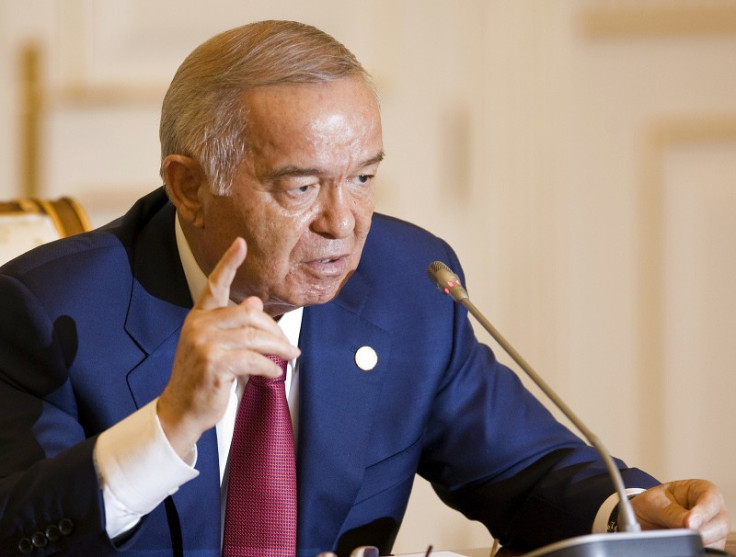Eurasian Economic Union: Putin's Soviet Union vision looms in 2015 but is already reduced to wishful thinking

Russia has struggled to find its place in the world after the collapse of the Soviet Union. A former superpower with a throbbing vein of nationalism running through its population, Russia's pride is hurt. It wants its status back.
President Vladimir Putin thinks he's the man with the restorative power to heal the old wounds. He hopes to do it through the Eurasian Economic Union (EEU), the grand-sounding integration of a handful of old Soviet states, which begins on 1 January, 2015.
It has become his pet project. Sadly for him, it may have already failed. Some states are refusing to join and there is infighting already among those who have signed up to a customs union pre-empting fuller EEU integration. This was always about more than just economics.
"They try to present it as Kazakh – the father of the idea was the Kazakh President Nazarbayev – but this could only happen because Putin has become interested," Dr Kataryna Wolczuk of the University of Birmingham's Centre for Russian, European and Eurasian Studies told IBTimes UK.
"There was no need for such a regime. It is basically a political project dressed up as an economic exercise."
Wolzcuk said Kazakhstan doesn't do much trade with Russia and Belarus is already closely integrated with the Kremlin, which means the EEU's economic rationale is "very, very weak".

"What was designed as a geo-economic framework is increasingly becoming a geopolitical issue," wrote Dr David Cadier, editor of the London School of Economics' Ideas journal, in a June 2014 special issue entitled The Geopolitics of Eurasian Economic Integration.
"In attempting to counter the influence of the EU's alternative integration regime (the Eastern Partnership), Russia has shifted its diplomacy from persuasion to coercion, and Moscow is increasingly resorting to using the EEU as a foreign policy tool.
"The countries of the entredeux – literally, something placed between two things – are being forced to face to a geopolitical choice they had been trying to avoid, or at least to defuse."
Coercion
Putinism can be summed up by its three central features: nationalism, despotism and expansionism. It is nationalist because it stokes Russian patriotism and pride: Putin has an 81% approval rating among Russians, according to an AP poll.
It is despotic because power is concentrated in the hands of Putin, his oligarchs, and senior security officials. And it is expansionist because it seeks to use political, economic and military power to bring others under Moscow's influence. The EEU is an expansionist manifestation of Putinism.
The EEU is intended to rival the European Union (EU), which has been luring old Soviet countries westwards with lucrative free trade agreements. Lithuania, Latvia and Estonia have already joined the EU and Nato.
It's the extension of an existing 2011 customs union between Russia, Belarus and Kazakhstan and is founded on the same four fundamental freedoms as the EU: movement of goods, services, capital, and people.

With Moscow at the centre of power, which is where the EEU headquarters will be, Putin had hoped to recreate some of the former Soviet sphere of influence. Armenia has committed to joining the EEU. Kyrgyzstan is working on joining, as is Tajikistan.
But Putin has been snubbed by other states he had hoped to shoehorn in.
Georgia, Moldova and Ukraine have all chosen closer economic, financial and political integration with the EU under its 'Eastern Partnership' initiative to build ties with ex-Soviet states. Azerbaijan, which is technically at war with Armenia, has ruled out joining.
Uzbekistan's autocratic president Islam Karimov also rejected joining the EEU because it would mean a loss of sovereignty.
This is something that has concerned most of Putin's target leaders, who have not long secured power back from Moscow and, having consolidated it in their own hands, are unwilling to let any go again.
"They say they are only creating an economic market and they will not in any way give up their sovereignty and independence," Karimov said of the union, underlining his concern. "Tell me, can there be political independence without economic independence?"
Karimov, acknowledging Putin's attempt to regroup post-Soviet states back under Moscow's wing, had previously said that "history cannot be reversed".
Hilary Clinton, the former US secretary of state, outright accused Putin of using the EEU to "re-Sovietize" parts of Eastern Europe and Central Asia.
Powerful arguments
Eurasian Economic Union: Population and GDP
Russia - Population: 142.4 million. GDP: $2.55tn.
Belarus - Population: 9.6 million. GDP: $150bn.
Kazakhstan - Population: 17.9 million. GDP: $243.6bn.
Armenia - Population: 3 million. GDP: $20.6bn.
Source: CIA World Factbook
Armenia had been touting for months that it would sign an EU association agreement. After a one-on-one meeting in September 2013 between Putin and Armenian President Sargsyan, the country's position mysteriously and abruptly changed. It would join the EEU.
Exactly the same thing happened with Ukrainian President Viktor Yanukovich just two months later.
It was the attempt by Yanukovich to link Kiev with the Kremlin-led EEU and shun closer ties with the EU – something his country had been working towards for two decades – which led to the Maidan street protests. He was ousted and exiled.
Now Ukraine is in the grip of a civil war between Kiev loyalists and Russian-backed separatists. In March, the post-Yanukovich administration signed an association agreement with the EU. Putin, who had long threatened EEU protectionism against Kiev if it chose the EU, said the agreement would break the Ukraine up because of its population's divided loyalties.
Today's states which made up the USSR before 1991.
Armenia, Azerbaijan, Belarus, Estonia, Georgia, Kazakhstan, Kyrgyzstan, Latvia, Lithuania, Moldova, Russia, Tajikistan, Turkmenistan, Ukraine, Uzbekistan.
Putin's power to persuade has its limits.
"We don't know in either of the cases what arguments were used," Wolczuk said.
"We know that the arguments must have been very powerful. The Russians must have used all ammunition.
"Probably about political survival, destroying the political regimes. Both Sargsyan and Yanukovich's political fate would have been sealed if they didn't agree. But even with that, the power of attraction is rather low so it took a lot of persuasion. And in Ukraine, even that didn't help."
Nominally, the member states are on equal footing. Despite the scale of Russia compared to Belarus, both have the same number of votes on matters relating to the EEU: one. This is the compromise Putin had to make to first get the customs union off the ground and now the EEU in 2015.
"Kazakhstan and Belarus seem to be basically equal to Russia," Wolczuk said.
"In practice, Kazakhstan just wants economic benefits from trade liberalisation and better access to the Russian market. Whereas in Belarus, President Lukashenko is dependent on economic support from Russia. And it was basically about arm-twisting."
Sanctions
Cracks have already formed in the customs union ahead of the formal start of the EEU. Following Russia's military intervention in Ukraine, with its annexation of Crimea and support of armed separatists in the country's east, the West put sanctions on Russia.
The Kremlin retaliated with its own. One set of sanctions was on Western food imports. And this is where the customs union with Kazakhstan and Belarus came unstuck.
Belarus was still importing Western food, which it had been accused of selling on to Russian companies within the customs union – which means open borders for trade, without checks or tariffs – and so undermined the Kremlin's sanctions.
"Russia in retaliation basically imposed embargoes and stopped Belarussian transits," Wolzcuk said.
"What Belarus claims were transits [of Western goods] to Kazakhstan, Russia says are actually destined for Russia. They also embargoed some Belarussian companies.

"It's a mess. Belarus, basically in retaliation, reinstated customs checks on the border with Russia. So the customs union, the biggest achievement of the whole project because the rest is really about treaties and declarations, has been jeopardised in the last couple of weeks.
"So it shows you how it's all political negotiations, and not rules-based economic integration as such."
Eventually, Russia and Belarus reached a settlement. Western food could be imported to Russia through Belarus, but only if it had been processed there.
But there are more fundamental problems with the EEU. The EU works because it is rules-based and the democratic member states, broadly speaking, adhere to them. Russia, Belarus and Kazakhstan are all autocracies subject to the whims of the ruling elite, their heads of state in particular have "a rather dodgy commitment to the rule of law," Wolczuk said.
"When you do economic integration like the EU, rules and law is everything. This is exactly what [EEU states] are not terribly good about," she said.
"There are summits, there are declarations, there are treaties, but they really lag behind when it comes to the actual implementation of what they agree on."
Belarus ranks 119 out of 175 on Transparency International's Corruption Perceptions Index. Armenia is 94, Kazakhstan is 126 and Russia, worst of all, is placed 136.
Reputational costs
Putin cannot let the EEU fail like so many of its predecessors – there have been ten attempts since 1991 – because the "reputation costs to Russia are too high," Wolczuk said.
"And they are very, very high. Putin just cannot afford – having tried to entice Ukraine to join, having twisted Armenia's arms – to allow the project to unravel.
"Having said that, more likely what's going to happen is that it will share the fate of other integration projects. That there will be declarations, treaties and summits, and very little about actual substance and implementation.
"That's more likely. It's not going to be abandoned any time soon, but it may not live up to the expectations."
Wolczuk concluded: "It's very much forward looking and there are lots of declarations. So the Eurasian Economic Union provides relatively little value added to the previous integration status. Which underscores the point about it being a symbolic political project to demonstrate to the outside world and it's not yet, and perhaps will never be, backed with substance."
© Copyright IBTimes 2025. All rights reserved.






















